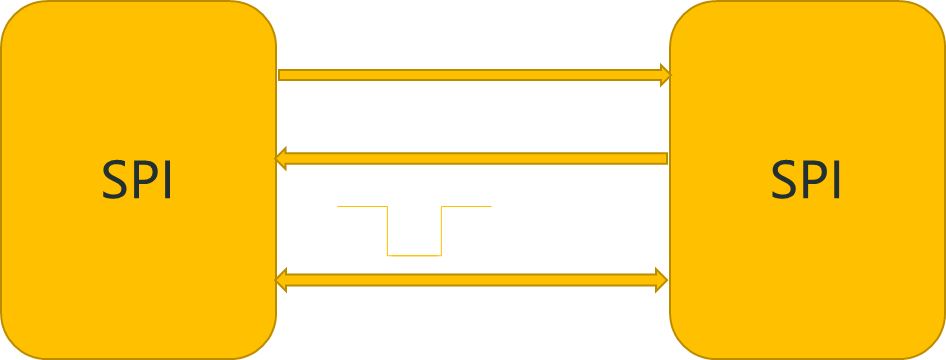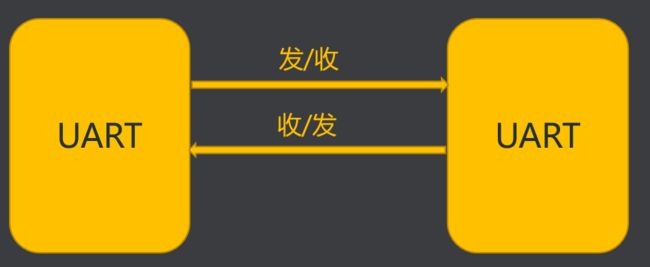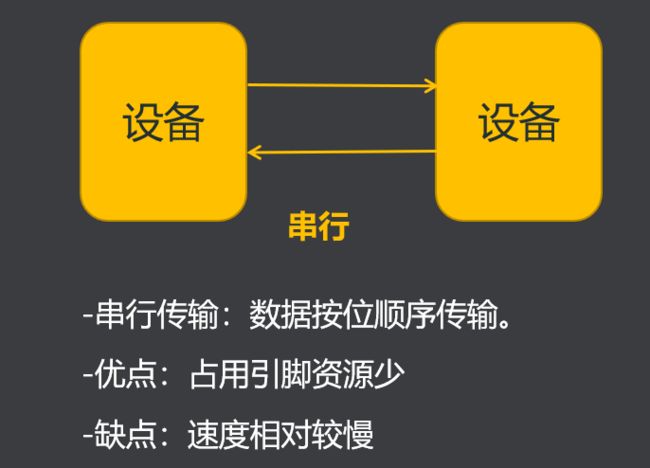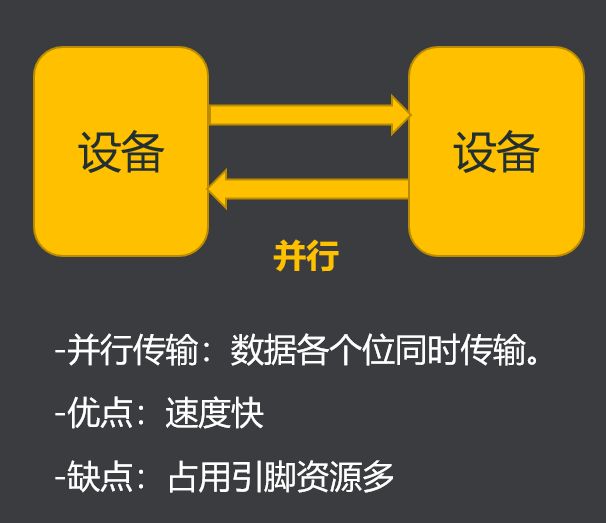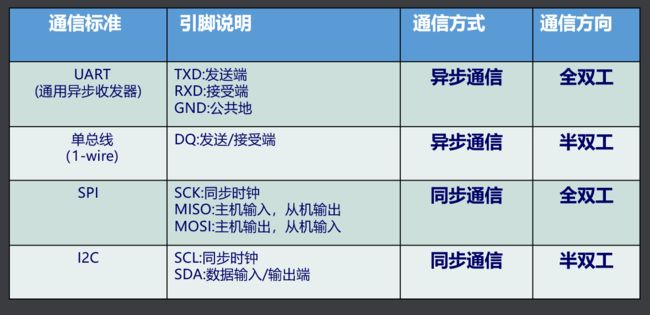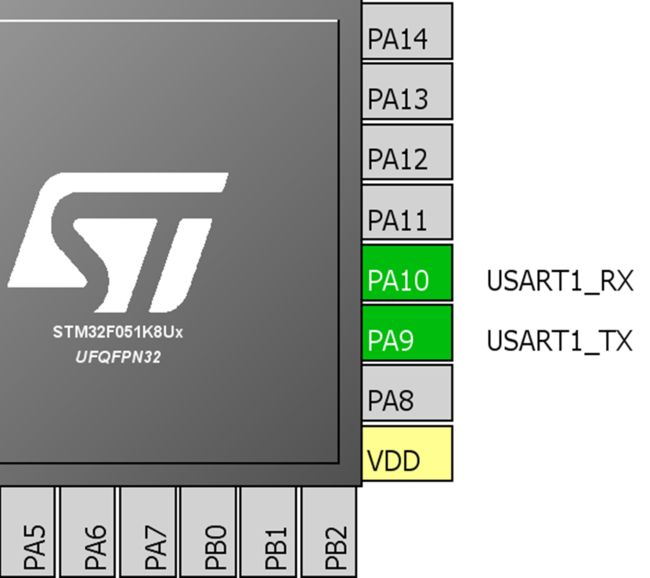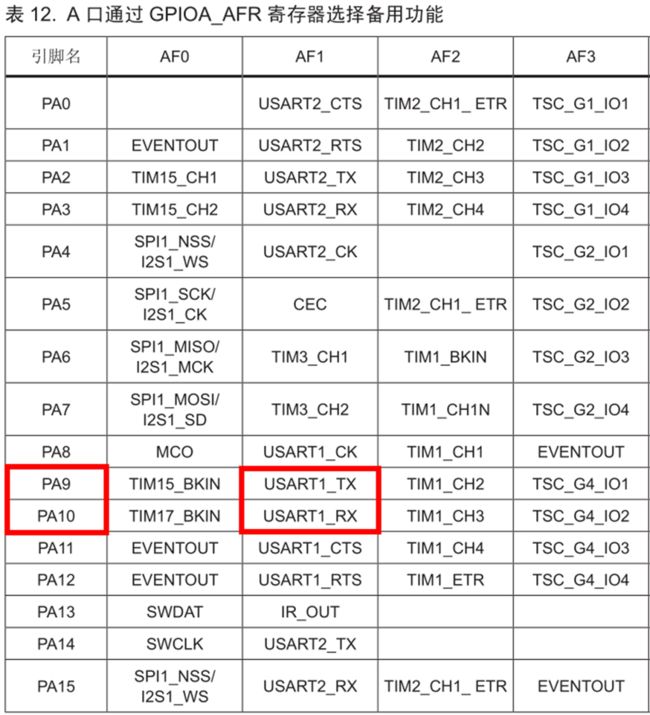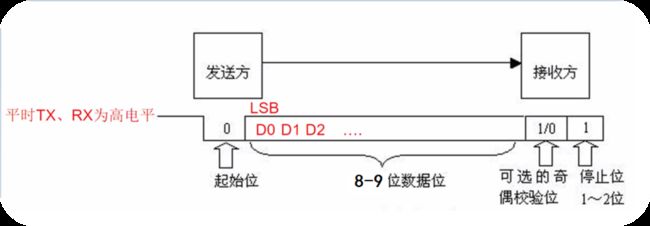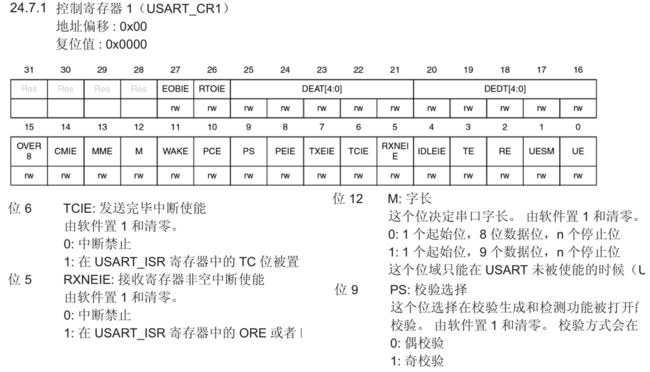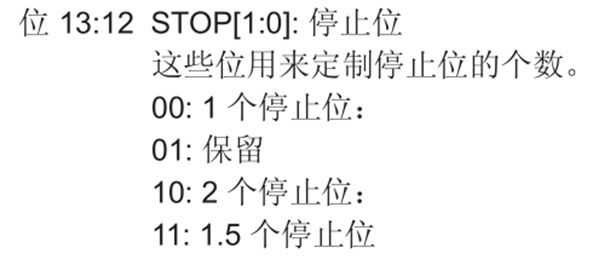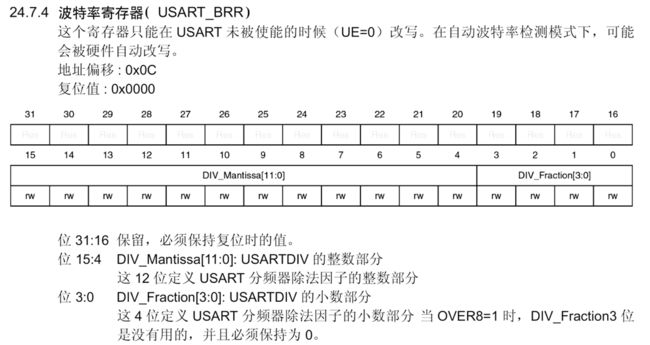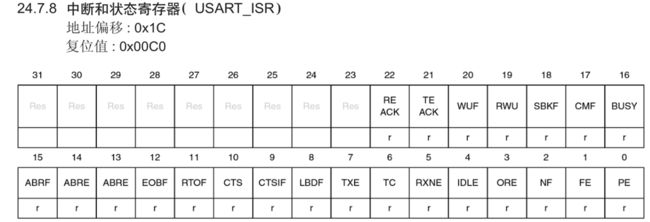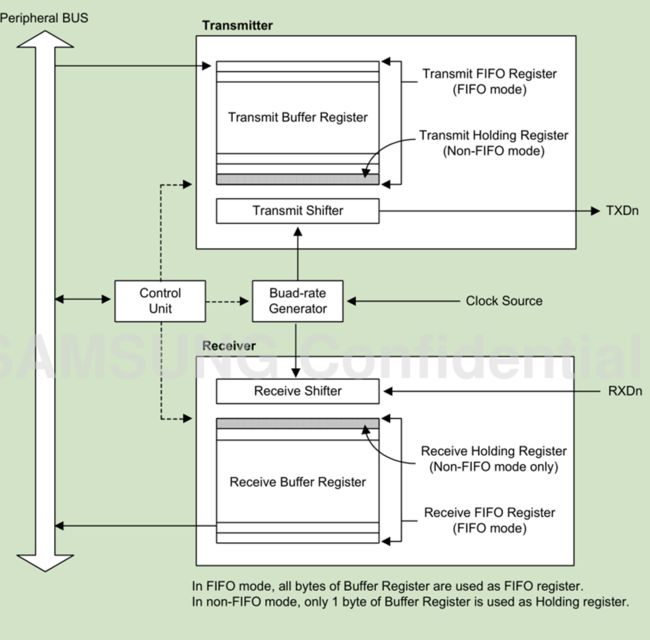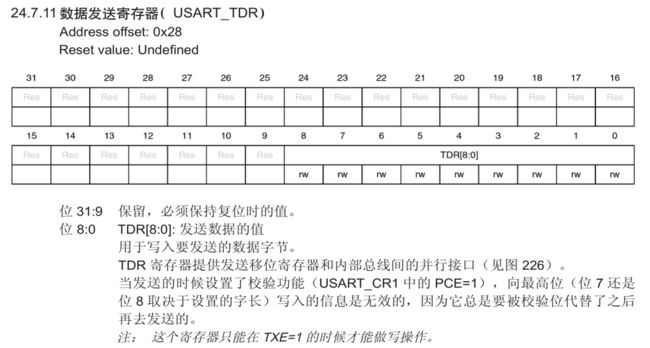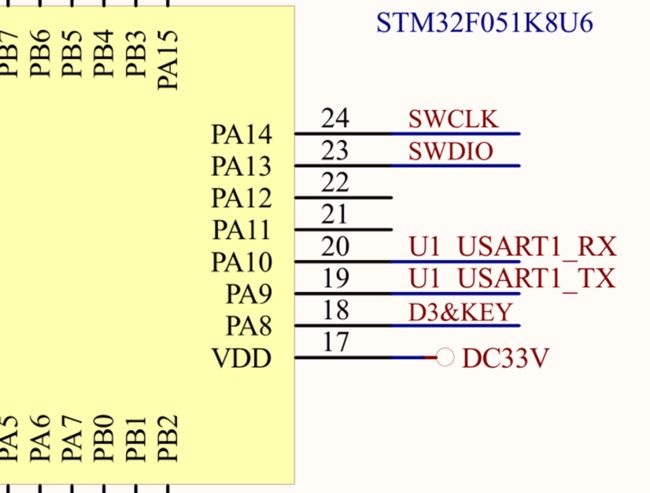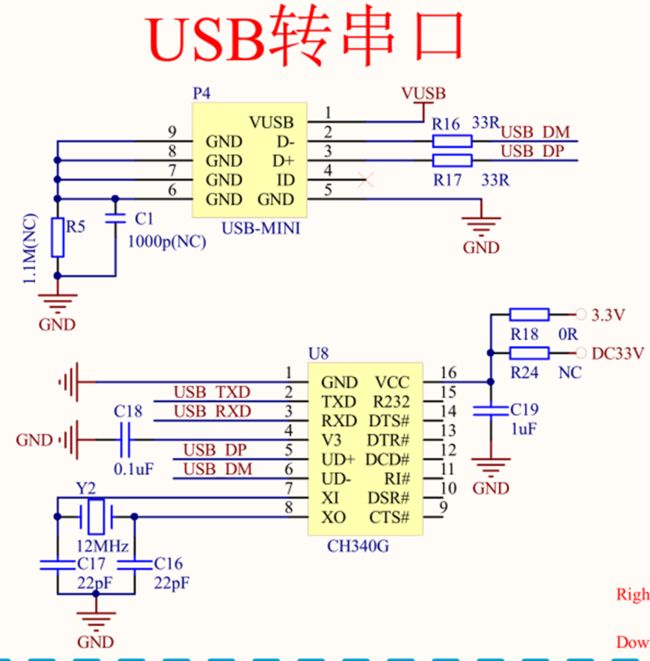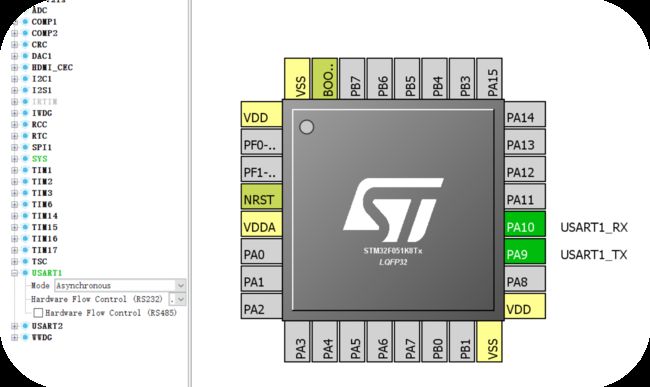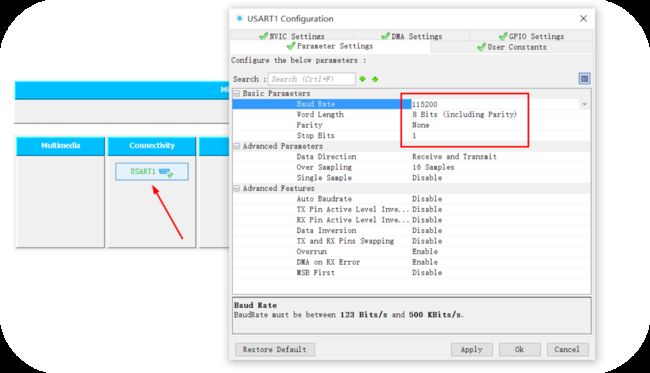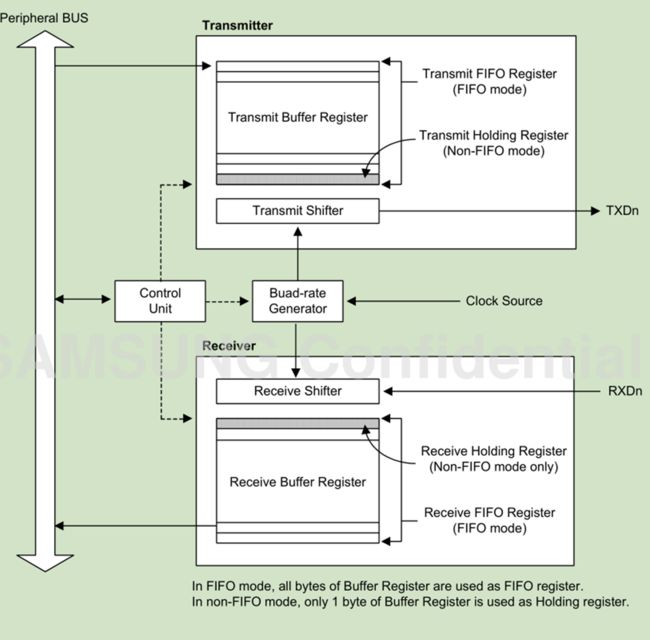串口通信(STM32演示实现)
目录
一、串行通信的概念
二、寄存器
2.1控制寄存器USART_CR1
2.2控制寄存器USART_CR2编辑
2.3串口寄存器USART_BRR
2.4 USART_ISR
2.5USART_TDR
2.6USART_RDR编辑
三、实现串口数据的收发
一、串行通信的概念
u通信,最少要有两个对象,一个收,一个发u同步通信:一般情况下同步通信指的是通信双方根据同步信号进行通信的方式。比如通信双方有一个共同的时钟信号,大家根据时钟信号的变化进行通信
u异步通信:是指数据传输速度匹配依赖于通信双方有自己独立的系统时钟,大家约定好通信的速度。异步通信不需要同步信号,但是并不是说通信的过程不同布
u串行通信:指的是同一时刻只能收或发一个bit位信息。因此只用1根信号线即可。u并行通信:指的是同一时刻可以收或发多个bit位的信息,因此需要多根信号线才行
u 单工:要么收,要么发,只能做接收设备或者发送设备。比如收音机u 半双工:可以收,可以发,但是不能同时收发, 比如对讲机u 全双工:可以在同一时刻既接收,又发送。 手机
n 通用同步异步收发器(USART)灵活地与外部设备进行全双工数据通信,满足外部设备对工业标准NRZ异步串行数据格式的要求。USART通过小数波特率发生器提供了多种波特率。它支持同步单向通信和半双工单线通信;还支持LIN(局域互联网络),智能卡协议与IrDA(红外数据协会)SIR ENDEC规范,以及调制解调操作(CTS/RTS)。而且,它还支持多处理器通信。n USART支持同步模式,因此USART 需要同步始终信号USART_CK(如STM32 单片机),通常情况同步信号很少使用,因此USART和一般单片机UART使用方式是一样的,都使用异步模式。
STM32F051内置多达两个通用同步 / 异步收发器( USART1 和 USART2 ),通信速度可达 6 Mbit / s
0 1 0 1 0 0 0 0 0 0
TXD 串口输出0x05波形图、低位先发送:
l 在串行通信中,用“波特率”来描述数据的传输速率。所谓波特率,既每秒传送的二进制位数,其单位为bps(bits per second)。它是衡量串行数据速度快慢的重要指标。l 国际上规定一个标准的波特率系列: 110、300、600、1200、1800、2400、4800、9600、115200、14.4Kbps、19.2Kbps、……例如:115200bps、指每秒传送115200位。通信双方必须设置同样的同学速率才能正常通信
l 注意:实际的数据没这么多,还包括起始位,结束位,校验位
二、寄存器
2.1控制寄存器USART_CR1
2.2控制寄存器USART_CR2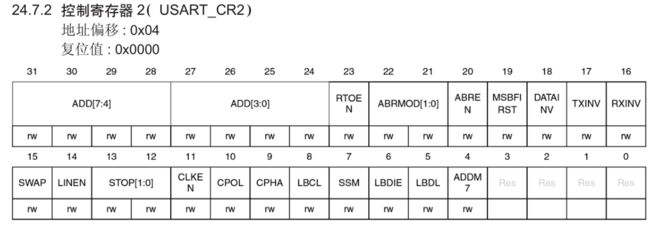
2.3串口寄存器USART_BRR
2.4 USART_ISR
2.5USART_TDR
2.6USART_RDR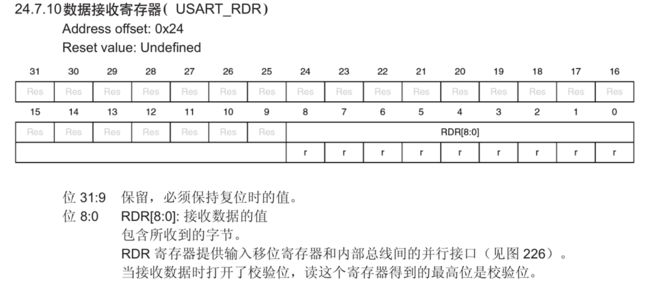
三、实现串口数据的收发
这是F051的电路图
注意:如果无法识别串口,清装好ch340串口驱动
左侧可以直接选
void Uart_Putchar(uint8_t ch)
{
while(!(USART1->ISR &(1<<7))); //等待发送寄存器空
USART1->TDR = ch; //发送字符
}
void Uart_Putstring(uint8_t *str)
{
while(*str != '\0')
{
Uart_Putchar(*str);
str++;
}
}
uint8_t Uart_Getchar(void)
{
while(!(USART1->ISR & (1<<5))); //等待收到一个字符的数据
return USART1->RDR; //返回收到的字符
}
Stm32f0xx_hal_uart.c 文件中
串口的发送函数HAL_UART_Transmit(UART_HandleTypeDef *huart, uint8_t *pData, uint16_t Size, uint32_t Timeout)
串口的接收函数HAL_UART_Receive(UART_HandleTypeDef *huart, uint8_t *pData, uint16_t Size, uint32_t Timeout)
printf函数调用的是c库中的fputc函数。因此我们如果重新写了fputc函数,就可以改变printf函数的功能,可以向串口打印输出。
int fputc(int ch,FILE *f){ while((USART1->ISR&(1<<7)) == 0); USART1->TDR=(uint8_t)ch;
return ch;}
/**
******************************************************************************
* File Name : main.c
* Description : Main program body
******************************************************************************
** This notice applies to any and all portions of this file
* that are not between comment pairs USER CODE BEGIN and
* USER CODE END. Other portions of this file, whether
* inserted by the user or by software development tools
* are owned by their respective copyright owners.
*
* COPYRIGHT(c) 2017 STMicroelectronics
*
* Redistribution and use in source and binary forms, with or without modification,
* are permitted provided that the following conditions are met:
* 1. Redistributions of source code must retain the above copyright notice,
* this list of conditions and the following disclaimer.
* 2. Redistributions in binary form must reproduce the above copyright notice,
* this list of conditions and the following disclaimer in the documentation
* and/or other materials provided with the distribution.
* 3. Neither the name of STMicroelectronics nor the names of its contributors
* may be used to endorse or promote products derived from this software
* without specific prior written permission.
*
* THIS SOFTWARE IS PROVIDED BY THE COPYRIGHT HOLDERS AND CONTRIBUTORS "AS IS"
* AND ANY EXPRESS OR IMPLIED WARRANTIES, INCLUDING, BUT NOT LIMITED TO, THE
* IMPLIED WARRANTIES OF MERCHANTABILITY AND FITNESS FOR A PARTICULAR PURPOSE ARE
* DISCLAIMED. IN NO EVENT SHALL THE COPYRIGHT HOLDER OR CONTRIBUTORS BE LIABLE
* FOR ANY DIRECT, INDIRECT, INCIDENTAL, SPECIAL, EXEMPLARY, OR CONSEQUENTIAL
* DAMAGES (INCLUDING, BUT NOT LIMITED TO, PROCUREMENT OF SUBSTITUTE GOODS OR
* SERVICES; LOSS OF USE, DATA, OR PROFITS; OR BUSINESS INTERRUPTION) HOWEVER
* CAUSED AND ON ANY THEORY OF LIABILITY, WHETHER IN CONTRACT, STRICT LIABILITY,
* OR TORT (INCLUDING NEGLIGENCE OR OTHERWISE) ARISING IN ANY WAY OUT OF THE USE
* OF THIS SOFTWARE, EVEN IF ADVISED OF THE POSSIBILITY OF SUCH DAMAGE.
*
******************************************************************************
*/
/* Includes ------------------------------------------------------------------*/
#include "main.h"
#include "stm32f0xx_hal.h"
#include "usart.h"
#include "gpio.h"
/* USER CODE BEGIN Includes */
#include
/* USER CODE END Includes */
/* Private variables ---------------------------------------------------------*/
/* USER CODE BEGIN PV */
/* Private variables ---------------------------------------------------------*/
/* USER CODE END PV */
/* Private function prototypes -----------------------------------------------*/
void SystemClock_Config(void);
/* USER CODE BEGIN PFP */
/* Private function prototypes -----------------------------------------------*/
/* USER CODE END PFP */
/* USER CODE BEGIN 0 */
int fputc(int ch, FILE *f)
{
while( !(USART1->ISR & (1<<7))); //等待TDR为空
USART1->TDR = ch;
}
/* USER CODE END 0 */
int main(void)
{
/* USER CODE BEGIN 1 */
uint8_t ch[20] = {0};
/* USER CODE END 1 */
/* MCU Configuration----------------------------------------------------------*/
/* Reset of all peripherals, Initializes the Flash interface and the Systick. */
HAL_Init();
/* USER CODE BEGIN Init */
/* USER CODE END Init */
/* Configure the system clock */
SystemClock_Config();
/* USER CODE BEGIN SysInit */
/* USER CODE END SysInit */
/* Initialize all configured peripherals */
MX_GPIO_Init();
MX_USART1_UART_Init();
/* USER CODE BEGIN 2 */
//HAL_UART_Transmit(&huart1, "this is uart test\n", strlen("this is uart test\n"), 100);
printf("this is printf test\n");
/* USER CODE END 2 */
/* Infinite loop */
/* USER CODE BEGIN WHILE */
while (1)
{
// ch = Uart_Getchar();
// Uart_Putchar(ch);
HAL_UART_Receive(&huart1, ch, 19 , 100);
HAL_UART_Transmit(&huart1, ch, strlen(ch), 100);
memset(ch,0,20);
/* USER CODE END WHILE */
/* USER CODE BEGIN 3 */
}
/* USER CODE END 3 */
}
/** System Clock Configuration
*/
void SystemClock_Config(void)
{
RCC_OscInitTypeDef RCC_OscInitStruct;
RCC_ClkInitTypeDef RCC_ClkInitStruct;
RCC_PeriphCLKInitTypeDef PeriphClkInit;
/**Initializes the CPU, AHB and APB busses clocks
*/
RCC_OscInitStruct.OscillatorType = RCC_OSCILLATORTYPE_HSI;
RCC_OscInitStruct.HSIState = RCC_HSI_ON;
RCC_OscInitStruct.HSICalibrationValue = 16;
RCC_OscInitStruct.PLL.PLLState = RCC_PLL_NONE;
if (HAL_RCC_OscConfig(&RCC_OscInitStruct) != HAL_OK)
{
_Error_Handler(__FILE__, __LINE__);
}
/**Initializes the CPU, AHB and APB busses clocks
*/
RCC_ClkInitStruct.ClockType = RCC_CLOCKTYPE_HCLK|RCC_CLOCKTYPE_SYSCLK
|RCC_CLOCKTYPE_PCLK1;
RCC_ClkInitStruct.SYSCLKSource = RCC_SYSCLKSOURCE_HSI;
RCC_ClkInitStruct.AHBCLKDivider = RCC_SYSCLK_DIV1;
RCC_ClkInitStruct.APB1CLKDivider = RCC_HCLK_DIV1;
if (HAL_RCC_ClockConfig(&RCC_ClkInitStruct, FLASH_LATENCY_0) != HAL_OK)
{
_Error_Handler(__FILE__, __LINE__);
}
PeriphClkInit.PeriphClockSelection = RCC_PERIPHCLK_USART1;
PeriphClkInit.Usart1ClockSelection = RCC_USART1CLKSOURCE_PCLK1;
if (HAL_RCCEx_PeriphCLKConfig(&PeriphClkInit) != HAL_OK)
{
_Error_Handler(__FILE__, __LINE__);
}
/**Configure the Systick interrupt time
*/
HAL_SYSTICK_Config(HAL_RCC_GetHCLKFreq()/1000);
/**Configure the Systick
*/
HAL_SYSTICK_CLKSourceConfig(SYSTICK_CLKSOURCE_HCLK);
/* SysTick_IRQn interrupt configuration */
HAL_NVIC_SetPriority(SysTick_IRQn, 0, 0);
}
/* USER CODE BEGIN 4 */
/* USER CODE END 4 */
/**
* @brief This function is executed in case of error occurrence.
* @param None
* @retval None
*/
void _Error_Handler(char * file, int line)
{
/* USER CODE BEGIN Error_Handler_Debug */
/* User can add his own implementation to report the HAL error return state */
while(1)
{
}
/* USER CODE END Error_Handler_Debug */
}
#ifdef USE_FULL_ASSERT
/**
* @brief Reports the name of the source file and the source line number
* where the assert_param error has occurred.
* @param file: pointer to the source file name
* @param line: assert_param error line source number
* @retval None
*/
void assert_failed(uint8_t* file, uint32_t line)
{
/* USER CODE BEGIN 6 */
/* User can add his own implementation to report the file name and line number,
ex: printf("Wrong parameters value: file %s on line %d\r\n", file, line) */
/* USER CODE END 6 */
}
#endif
/**
* @}
*/
/**
* @}
*/
/************************ (C) COPYRIGHT STMicroelectronics *****END OF FILE****/
